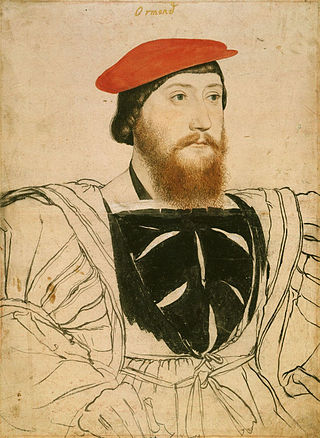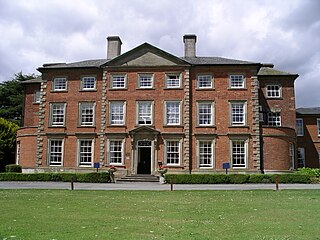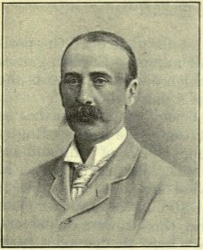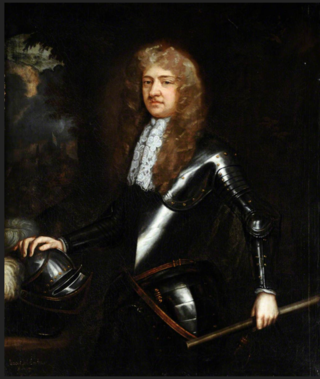
James FitzJames Butler, 2nd Duke of Ormonde, (1665–1745) was an Irish statesman and soldier. He was the third of the Kilcash branch of the family to inherit the earldom of Ormond. Like his grandfather, the 1st Duke, he was raised as a Protestant, unlike his extended family who held to Roman Catholicism. He served in the campaign to put down the Monmouth Rebellion, in the Williamite War in Ireland, in the Nine Years' War and in the War of the Spanish Succession but was accused of treason and went into exile after the Jacobite rising of 1715.

Vice-Admiral Thomas Butler, 6th Earl of Ossory, KG, PC, PC (Ire) (1634–1680) was an Irish soldier and politician. He was the eldest son of James Butler, 1st Duke of Ormond but predeceased his father and therefore never succeeded as duke.

Albert Neilson Hornby, nicknamed Monkey Hornby was one of the best-known sportsmen in England during the nineteenth century excelling in both rugby and cricket. He was the first of only two men to captain the country at both rugby and cricket but is also remembered as the England cricket captain whose side lost the Test match which gave rise to the Ashes, at home against the Australians in 1882. Additionally, he played football for Blackburn Rovers.

Gerald FitzGerald, 14th Earl of Desmond, also counted as 15th or 16th, owned large part of the Irish province of Munster. In 1565 he fought the private Battle of Affane against his neighbours, the Butlers. After this, he was for some time detained in the Tower of London. Though the First Desmond Rebellion took place in his absence, he led the Second Desmond Rebellion from 1579 to his death and was therefore called the Rebel Earl. He was attainted in 1582 and went into hiding but was hunted down and killed.
Richard Burke, 4th Earl of Clanricarde was an Irish nobleman and politician.
John Butler, 17th Earl of Ormonde, 10th Earl of Ossory (1740–1795) was an Irish peer and Member of Parliament (MP). He became a Protestant in 1764. He was an Irish MP, representing Gowran between 1776 and 1783, and Kilkenny City between 1783 and 1792. In 1791, his right to the peerage was acknowledged in the Irish House of Lords and he became the 17th Earl of Ormond.

Lieutenant-General Charles Butler, 1st Earl of Arran, de jure3rd Duke of Ormonde (1671–1758) was an Anglo-Irish peer. His uncle Richard was the 1st Earl of Arran of the first creation. The titles were re-created for Charles in 1693. His elder brother, the 2nd Duke of Ormonde, was attainted during the Jacobite rising of 1715, but in 1721 Arran was allowed to buy the estate back. At the death of the 2nd Duke, he succeeded as de jure 3rd Duke of Ormonde in the Irish peerage but did not claim the title.
Sir Walter Butler, 11th Earl of Ormond and 4th Earl of Ossory (1559–1633), succeeded his uncle the 10th earl, in 1614. He was called "Walter of the Beads" because he was a devout Catholic, whereas his uncle had been a Protestant. King James I intervened and awarded half of the inheritance to his uncle's Protestant daughter Elizabeth. Ormond contested the King's decision and was for that detained in the Fleet Prison from 1619 until 1625 when he submitted to the King's ruling. He then found a means to reunite the Ormond estate, by marrying his grandson James, who had been raised a Protestant, to Elizabeth's only daughter.

James Butler, 9th Earl of Ormond and 2nd Earl of Ossory, known as the Lame, was in 1541 confirmed as Earl of Ormond thereby ending the dispute over the Ormond earldom between his father, Piers Butler, 8th Earl of Ormond, and Thomas Boleyn, 1st Earl of Wiltshire. He died from poison in London.

James Hamilton, 6th Earl of Abercorn, PC (Ire), was a Scottish and Irish peer and politician. Appointed a groom of the bedchamber to Charles II after his father's death in battle, he took the Williamite side at the Glorious Revolution and in March 1689 supplied Derry with stores that enabled the town to sustain the Siege of Derry until it was relieved in August. Shortly after inheriting a Scottish and Irish peerage from a second cousin, he was created a viscount in Ireland for his services to the Williamite cause.

Edward Kewley was an English sportsman who played rugby union for England and also played first-class cricket for Lancashire. He captained England three times, and was the first captain to be drawn from the north of England as well as captaining England in the first ever 15-a-side international.

Ansty Hall is a 17th-century country house, located in the village of Ansty, and near Coventry and Rugby, Warwickshire, which is now a four star hotel operated by Exclusive Hotels. It is a Grade II* listed building surrounded by 8 acres of landscaped gardens.

Frederick Stokes was the first captain of the England national rugby union team, who played for and captained the team in the first three rugby internationals, all between England and Scotland. He was also the youngest president of the Rugby Football Union.

Richard Butler, 1st Earl of Arran (1639–1686) was Lord Deputy of Ireland from 1682 to 1684 while James Butler, 1st Duke of Ormonde, his father, the Lord Lieutenant, was absent in England. He sat in the Irish House of Lords as Earl of Arran and in the English one as Baron Butler of Weston. When William Howard, 1st Viscount Stafford was accused of treason during the Popish Plot, Arran braved the anti-Catholic hysteria and voted not guilty.
Henry Arnold Lawrence was a rugby union forward who played club rugby for Richmond F.C. and international rugby for England. He was the third captain of the England rugby team.

Robert John Verney, 17th Baron Willoughby de Broke and de jure25th Baron Latimer of Compton Verney in Warwickshire, was a peer in the peerage of England.

Francis Luscombe was a rugby union international who represented England from 1872 to 1876. He also captained his country.
Thomas Butler, Viscount Thurles was the son and heir apparent of Walter Butler, 11th Earl of Ormond (1559–1633), whom he predeceased. He lived at the Westgate Castle in Thurles, County Tipperary. He was the father of the Irish statesman and Royalist commander James Butler, 1st Duke of Ormonde.

Lieutenant-Colonel Warner Francis John Plantagenet Hastings, 15th Earl of Huntingdon, DL was a British peer, and Deputy Lieutenant of King's County, Ireland.
Charles Bryden (1852-1941) was a rugby union international who represented England from 1875 to 1877.













